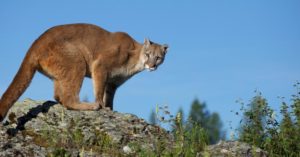Protecting Colorado’s wild cats from trophy hunting

It’s time to stop this cruelty
Each year, hunters and trappers kill hundreds of mountain lions and thousands of bobcats in Colorado for nothing more than a trophy and bragging rights.
But we can stop this cruel and needless practice by passing legislation in 2022 that will prohibit the trophy hunting and trapping of wild cats in Colorado.
Even though fur sales are plummeting across the world, trappers still target Colorado’s bobcats for their soft belly fur, which is sold on international markets. Canada lynx, who are very similar in appearance to bobcats, could soon lose their protections under the federal Endangered Species Act, putting their small population in Colorado at risk to trophy hunting.
We can’t win this fight without you
Wildlife populations already struggle with increasing threats to their survival. Trophy hunting is an unnecessary, lethal threat to Colorado’s wild cats.
According to a recent poll, the majority of Coloradans across this beautiful state oppose the needless killing of wild cats. Colorado state legislators will be voting on this bill very soon and elected officials need to know that this matters to you.
Stay informed
Sign up to receive the latest news and actions you can take to help animals.
Learn more
About the legislation
Colorado SB 31 prohibits only the trophy hunting (or sport hunting) and trapping of wild cats. While Colorado law prohibits hunters from wasting certain “edible” portions of a mountain lion, these animals are primarily killed as trophies and for bragging rights, not for their meat. The bill also provides commonsense exemptions for situations in which a wild cat must be lethally removed, such as in the rare occurrence where they may pose a threat to humans or farm animals, or if they must be humanely euthanized due to illness or injury.
This bill will:
PROTECT THESE CATS AND PROMOTE SOUND WILDLIFE MANAGEMENT
Colorado SB 31 not only protects wild cats themselves, but also Colorado’s beloved wild spaces that depend on these keystone animals to keep ecosystems, and even other wildlife, biologically diverse and healthy.
There is no scientifically sound reason to trophy hunt Colorado’s wild cats—these native carnivores manage their own populations just fine without human interference. Unlike deer or elk who depend on native carnivores to keep their populations in check and reduce the spread of disease, wild cats are limited by food availability, territory and other environmental factors. Simply put, Colorado’s wildlife is much better off if we protect wild cats from trophy hunting.
UPHOLD THE VALUES OF COLORADANS
Ending the trophy hunting of Colorado’s wild cats upholds the values and interests of the public rather than appeasing the small segment of hunters who participate in this cruel practice. Statewide surveys show that the majority of Coloradans oppose the trophy hunting of mountain lions and bobcats, including a majority of hunters, ranchers and people living throughout Colorado’s West Slope.
Meanwhile, mountain lion and bobcat hunters make up a minuscule portion of Colorado’s population—just a few thousand people hunt these animals in Colorado out of nearly 6 million residents. Mountain lion and bobcat hunting license fees provide less than 1% of Colorado Parks and Wildlife’s annual budget.
In contrast, revenue from Colorado taxpayers—most of whom oppose the cruel “sport”—provides at least 10 times more funding for the state’s wildlife agency.
INCREASE COEXISTENCE WITH WILD CATS
Research finds that the trophy hunting of wild cats is associated with increased conflicts with humans, pets and farm animals. We can prevent conflicts with wild cats by ending the trophy hunting of these animals and adopting cost-effective, non-lethal strategies to prevent these issues from occurring in the first place.
Trophy hunting does not reduce unwelcome interactions or negative encounters with wild cats because it is nonselective. In most cases, randomly killing these animals will not remove the individual cat involved in a conflict. It will likely worsen matters by orphaning inexperienced kittens and opening territories to subadults or “teenagers” who are more prone to conflicts.
Additional resources:
Natural history of bobcats [PDF]
Natural history of mountain lions in the U.S. [PDF]
Protect Colorado’s wild cats from trophy hunting [PDF]
Press Release: Colorado legislators introduce S.B. 31 to protect wild cats from trophy hunting
About us
We are a coalition dedicated to ending Colorado’s trophy hunts. Animal Welfare Institute, Boulder Bear Coalition, Center for Biological Diversity, Colorado Sierra Club, Mountain Lion Foundation, Project Coyote, The Humane Society of the United States and WildEarth Guardians.


